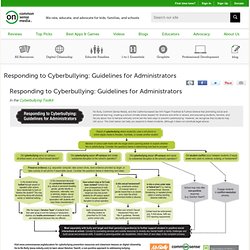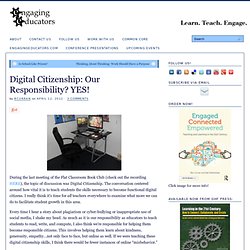

Project-Based, Problem-Based, or Inquiry-Based Learning? Cell phone etiquette poster for your school or classroom. Sfreking: Digital Citizenship Primer... BlogWise. Responding to Cyberbullying: Guidelines for Administrators. In the Cyberbullying Toolkit Register now to download a printable pdf!

No Bully, Common Sense Media, and the California-based law firm Fagen Friedman & Fulfrost believe that promoting social and emotional learning, creating a school climate where respect for diversity and skills is valued, and educating students, families, and faculty about how to behave ethically online are the best ways to prevent cyberbullying. However, we recognize that incidents may still occur.
The chart above can help you respond to these incidents, although it does not constitute legal advice. More Cyberbullying Prevention Resources Cyberbullying Toolkit. Digital Citizenship. Digital Citizenship Poster for Elementary Classrooms. Digiciti / FrontPage. Teaching and Modeling Good Digital Citizenship. Students that learn digital citizenship at school are more likely to practice it at home. Introducing School-Wide Digital Citizenship Practices with iPads. An elementary school in our district recently got 30 iPads and asked for some advice implementing them with students and teachers.

In addition to suggesting some starter apps, I recommended that we have conversations with kids around the appropriate use of these devices. While almost every child has used an iPad, iPod Touch, or iPhone, the exciting learning opportunities these mobile, Internet-connected, media creation devices create also open the door to new challenges. Cyberbullying or inappropriate web publishing happens more through the camera than regular computer use does; the mobility of the device combined with the reality that multiple users are using the device with no personalized, password-protected, network-tracked accounts makes it more challenging to keep track of who is doing what with the device or that the device itself is safe. Rather than tell the students how they should and should not use iPads, I felt compelled to involve the students in the conversation. Free Download: Digital Citizenship Poster.
Tagged with: digital citizenship As technology becomes more of an integral part of our society, it’s important to help students understand appropriate use of social media tools and other digital citizenship skills.

Edmodo offers various resources to help you get started, including security best practices, sample guidelines and a sample code of conduct for your students. To help you relay the importance of digital citizenship, we’ve also created a Best Practices for Digital Citizenship poster which you can print and display in your classroom, or share with your students. Download the poster: 8 1/2 x 11 version 11 x 17 version How do you teach students about digital citizenship? Digital Citizenship: Our Responsibility? YES! During the last meeting of the Flat Classroom Book Club (check out the recording HERE), the topic of discussion was Digital Citizenship.

The conversation centered around how vital it is to teach students the skills necessary to become functional digital citizens. I really think it’s time for all teachers everywhere to examine what more we can do to facilitate student growth in this area. Every time I hear a story about plagiarism or cyber-bullying or inappropriate use of social media, I shake my head. As much as it is our responsibility as educators to teach students to read, write, and compute, I also think we’re responsible for helping them become responsible citizens. This involves helping them learn about kindness, generosity, empathy…not only face to face, but online as well.
Many teachers will raise concerns about the parents’ role in all of this. For this reason, I think children as young as 6 should be learning how to blog and comment on blog posts of classmates.